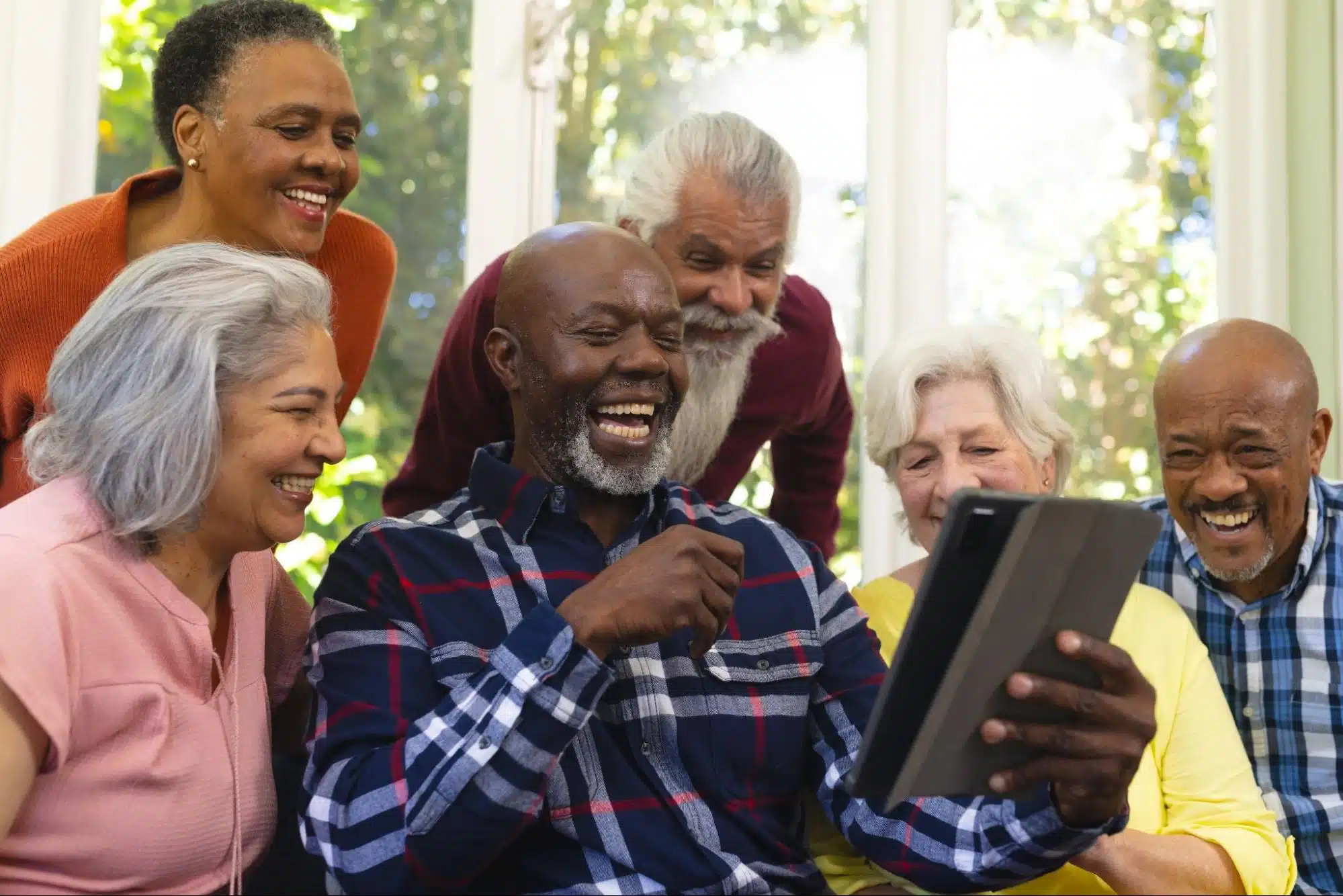Retirement offers the freedom to explore passions and spend more time with loved ones—but for many, it can also usher in a quieter, lonelier chapter. According to Statistics Canada, nearly one in five seniors aged 65 and older experience loneliness, which can have significant effects on health and overall quality of life.
The transition from structured work and consistent interactions to the open schedule of retirement presents new challenges for staying connected. Yet, it’s in this phase that social connection becomes critical, not just for happiness, but for cognitive health, emotional resilience, and maintaining independence. Staying engaged doesn’t have to be complicated, but it does need some level of intention.
The Importance of Social Connections for Seniors
Healthy aging depends on more than just physical health. Emotional and social wellness are equally vital—and deeply intertwined. Numerous studies confirm that isolation among older adults is a major risk factor for physical decline, including higher rates of heart disease, depression, and cognitive impairment.
Being socially connected offers clear benefits:
- Reduced stress through meaningful conversation and laughter
- Improved mood and emotional balance, particularly among widowed or single seniors
- Better memory and cognitive health, with regular mental stimulation from social interaction
- A stronger sense of purpose, especially when engaging in activities that help others
The Social Isolation of Seniors Toolkit, developed by the Government of Canada, emphasizes that connection isn’t just about being physically near others; it’s about fostering a sense of safety, feeling heard, and being supported.
How to Make New Friends in Retirement
One of the gifts of retirement is time—time to reflect, explore, and make new connections. Still, many retirees face a shrinking social circle, especially after moving to a new area, losing a spouse, or leaving a long-time job.
Making new friends may feel intimidating, but it’s never too late to create lasting relationships.
Here are some approachable ways to open new social doors:
- Start small: Smile, ask a neighbour how their day is going, or chat with someone in a fitness class.
- Volunteer: Roles at local food banks, museums, or libraries are great places to meet like-minded people.
- Join activity-based groups: Arts and crafts, book clubs, gardening circles, and faith-based study groups can all spark connection.
- Take a class: From tai chi to French lessons, senior-specific programs create social opportunities built around learning and fun.
Community Activities and Groups for Seniors
Community involvement remains one of the most effective ways to stay socially active. Across Canada, a wide range of senior-friendly programs exists to suit every interest and mobility level.
Look into these local opportunities:
- Senior centres and libraries often host free or low-cost classes, from fitness and crafts to speaker sessions and game nights.
- Faith-based organizations regularly organize outings, meals, and support groups.
- Community halls are home to seasonal fairs, cultural events, and hobby groups that welcome all ages.
To bridge generational gaps, consider:
- Mentorship programs with local schools or youth organizations
- Reading buddies through public libraries
- Intergenerational storytelling or crafting events
The Canadian Association of Retired Persons offers local chapter events across the country that combine fun with advocacy, helping seniors stay engaged in both community and civic life.
Staying Active as a Path to Connection
Physical activity isn’t just beneficial for health—it’s also one of the most natural ways to foster new connections. Whether it’s a regular walking group, a low-impact fitness class, or recreational sports, movement brings people together in shared purpose and routine. Seniors who stay active often find themselves more socially fulfilled, with stronger emotional well-being and a greater sense of daily structure.
Opportunities to explore might include:
- Community walking or hiking groups that meet at local parks
- Yoga, aqua-fit, or gentle aerobics classes tailored for older adults
- Social sports like pickleball or curling, which combine fun with light competition
These activities create moments to chat, laugh, and build bonds outside of home settings. Even a weekly session can make a big difference in one’s social rhythm and confidence. In addition, spending time outdoors has been linked to greater emotional vitality and more frequent social engagement among older adults.
Using Technology to Stay Connected
Tech tools have become valuable allies in helping older adults stay in touch with friends, family, and interest groups—especially when distance or health challenges limit in-person gatherings.
Here’s how seniors can use digital platforms to stay connected:
- Video calls via Zoom or FaceTime for face-to-face connection across the miles
- Messaging apps like WhatsApp or Facebook Messenger for daily check-ins and photo sharing
- Virtual communities, including hobby forums, online courses, and gaming groups for older adults
To get started:
- Ask for help from a tech-savvy friend or family member
- Attend workshops hosted by community centres, libraries, or senior centres
- Use accessibility settings like voice typing, magnification, or simplified interfaces
Many older adults are pleasantly surprised by how intuitive these tools can be, especially with a little guidance.
Keeping Social Through Meaningful Hobbies
Hobbies provide more than just entertainment; they create shared ground for connection and community. Whether returning to a passion or trying something new, hobby-based meetups often lead to enduring friendships and a renewed sense of purpose.
Popular examples include:
- Scrapbooking groups where stories, techniques, and memories are exchanged
- Gardening clubs in community spaces or backyard collectives
- Music ensembles or choirs that blend creativity with camaraderie
- Book clubs that transform reading into conversation and connection
Local community centres and libraries frequently offer bulletin boards or newsletters where these hobby groups are listed. Many seniors also find enjoyment in starting their own informal groups with neighbours or friends who share an interest.
For those who prefer solo activities, joining an online group or taking a virtual class can still provide social benefits. Scrapbooking, in particular, has been shown to foster emotional well-being, especially when shared with others in a group or family setting.
Overcoming Barriers to Socializing as a Senior
For some older adults, the desire to socialize is strong, but practical or emotional barriers can make it feel out of reach.
Common Challenges
- Mobility limitations
- Lack of transportation
- Hearing or vision impairments
- Low confidence or grief from a recent loss
- General social anxiety or discomfort in new settings
Practical Solutions
- Using paratransit or senior-specific rideshare services
- Inviting friends or neighbours to visit instead of travelling
- Starting small with weekly phone calls or short outings
- Seeking professional support—cognitive behavioural therapy or support groups can ease anxiety and rebuild confidence
Emotional safety matters just as much as physical safety. Having reliable access to help with Lifeline, whether through a wearable button or smartwatch, can provide the peace of mind needed to take those first steps with courage.
A Connected Life Is a Confident Life
Staying social in retirement isn’t about having a full calendar; it’s about finding joy in human connection and knowing you’re not alone. Whether it’s a weekly coffee group, a book club, or simply more time with grandchildren, these relationships are what turn the golden years into truly rewarding ones.
Lifeline Canada is proud to support that journey. By offering dependable safety tools designed with seniors in mind, we help older adults focus on living their fullest lives, confident, supported, and connected.
Take our 30-second Medical Alert Assessment to find out what system is right for you.
What You Should Do Now:
Here are 5 ways we can help you or your loved one live safer and more independently at home as long as possible:
- Get our latest tips, tools and resources straight to your inbox. Sign up for our monthly newsletter.
- Not sure if the time is right for a medical alert service? Take this quick assessment to find out.
- If you would like to learn how to live a healthier and safer lifestyle, go to our blog or visit our resources section, where you can read and download guides.
- Wondering which medical alert system company is the best for your needs? We’ve put together a guide comparing the best medical alert systems for you.




